|
|
|
Sort Order |
|
|
|
Items / Page
|
|
|
|
|
|
|
| Srl | Item |
| 1 |
ID:
105543
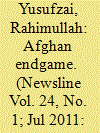

|
|
|
| 2 |
ID:
133668
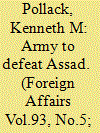

|
|
|
|
|
| Publication |
2014.
|
| Summary/Abstract |
Washington's current efforts to resolve the conflict in Syria will not break the stalemate. The only way to restore peace without committing U.S. troops is to build a new Syrian army capable of defeating both the Assad regime and the extremists.
|
|
|
|
|
|
|
|
|
|
|
|
|
|
|
|
| 3 |
ID:
132476
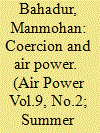

|
|
|
|
|
| Publication |
2014.
|
| Summary/Abstract |
Coercion has been the subject of many a study. To coerce an adversary's thought process and actions to one's own advantage is its end game. Paradoxically, there needs to be a con?uence of interests for discord to occur.' Coercion is not necessarily of the military kind only; in fact, a host of other measures constitute many permutations of actions that can be used to coerce an adversary's decision-making calculus. The North "Vietnamese took on the American military might in their unification effort, and movements and groups like Hamas and Hezbollah periodically fight the Israelis despite the military asymmetry that exists between the two; and the indigenous Afghans, in the long run, were not overawed, first by the might of the Soviet Union and then the Americans. In fact, one study suggests that the initiation of approximately 30 percent of conflicts has been done by the weaker party? Why does this happen and where does air power fit in the equation?
|
|
|
|
|
|
|
|
|
|
|
|
|
|
|
|
| 4 |
ID:
124877
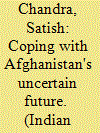

|
|
|
|
|
| Publication |
2013.
|
| Summary/Abstract |
India has, over the last decade or so, been a bit player in Afghanistan, and its influence on political developments there has been marginal. Accordingly, it has been on the fringes of international consultations on Afghanistan. It is not surprising, therefore, that its bitter opposition to talks with the Taliban was ignored. In comparison, Pakistan has been a much more important player and exercised far more influence than India at regional and international fora in the evolution of policies pertaining to Afghanistan. This is partially explicable by Pakistan's extensive border with Afghanistan, age old tribal links, deep rooted linkages with the Taliban, the Haqqani group and Al Qaeda, and a long and tortured history of incessant interference in that country. India's comparative lack of influence is due to the fact that though it has been proactive in bilateral diplomacy vis-à-vis the government of Afghanistan, it has been relatively inactive in reaching out to all shades of opinion in that country, maintaining close contacts with all key external players, and devising innovative and workable strategies for restoring peace and tranquillity in Afghanistan. It is time that India sheds its comparatively reticent posture on Afghanistan and becomes more involved on issues relating to developments there, as otherwise Pakistan will retain its dominant influence, which will obviously work to our detriment.
|
|
|
|
|
|
|
|
|
|
|
|
|
|
|
|
| 5 |
ID:
133162
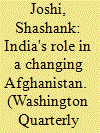

|
|
|
|
|
| Publication |
2014.
|
| Summary/Abstract |
As 2014 draws to a close, the war in Afghanistan will reprise the peripheral role it occupied for the United States and NATO between 2001 and 2006: out of sight, out of mind, and a distraction from other more pressing strategic challenges. Al-Qaeda's center of gravity has shifted away from Pakistan, at most a few hundred al-Qaeda operatives are left in Afghanistan, and the United States and European publics are weary of war.
For India, however, the Western drawdown of forces, culminating in the withdrawal of all US troops by 2016, will represent the greatest adverse structural shift in its security environment for over a decade, with potentially far-reaching implications for the Indian homeland and the country's regional position. It is a mistake to think that New Delhi would be inclined or able to salvage a disappointing military campaign on behalf of the West. The risk exists that India, like other regional actors anxious over the prospect of a security vacuum in the coming years, may adopt more independent and assertive policies in Afghanistan which diverge from those of the United States. However, one would be equally remiss to overlook the fundamental congruity of interests between Washington and New Delhi, and the opportunities that this might afford for cooperation.
|
|
|
|
|
|
|
|
|
|
|
|
|
|
|
|
| 6 |
ID:
162502
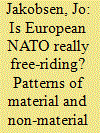

|
|
|
|
|
| Summary/Abstract |
Does European NATO free-ride on America? This article uses a mixed-methods approach to explore developments after the Cold War. I investigate both “material” measures, such as military expenditure and troop numbers, and a “non-material” indicator that draws on survey data of the public’s willingness to fight for their country. Results and conclusions are not univocal. On the one hand, European NATO members have generally reduced their military spending (relative to GDP), abolished conscription and downsized their military forces. Their citizens’ self-reported willingness to fight has also been quite low after the Cold War, in particular in states that host US military bases. On the other hand, some of these developments can surely be explained by a decrease in threat perceptions in Europe. Trends changed markedly after Russia’s 2014 annexation of Crimea, which moved many allies – in particular new NATO member states – to increase their defence efforts.
|
|
|
|
|
|
|
|
|
|
|
|
|
|
|
|
| 7 |
ID:
129650
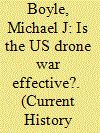

|
|
|
|
|
| Publication |
2014.
|
| Summary/Abstract |
Among the most distinctive features of US President Barack Obama's counterterrorism strategy has been his reliance on unmanned aerial vehicles-more commonly known as drones-to target terrorist operatives around the globe. The use of drones has rapidly expanded beyond the battlefields where US troops have openly engaged in conflict, such as Afghanistan and Iraq, to a range of undeclared combat zones, including Pakistan, Yemen, and Somalia. According to an official estimate, the US military launched in 1,160 drone strikes in Afghanistan alone between 2009 and 2012.
|
|
|
|
|
|
|
|
|
|
|
|
|
|
|
|
| 8 |
ID:
138606
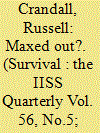

|
|
|
|
|
| Summary/Abstract |
Looking back on how decisively the Cold War ended in America’s favour, it is easy to forget how much doubt there was at the start, among Americans and Soviets alike, that the United States was up to the task of defending its vision of the post-war world order. George Kennan, the storied American diplomat responsible for the 1946 ‘Long Telegram’ from Moscow, recalled
in his memoirs that the Soviets ‘thought it probable that ... Americans, in particular, would not be able to muster, as a nation, the leadership, the imagination, the political skill, the material resources, and above all the national self-discipline necessary’ to prevail in the emerging global contest.
|
|
|
|
|
|
|
|
|
|
|
|
|
|
|
|
| 9 |
ID:
140525
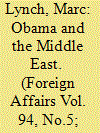

|
|
|
|
|
| Summary/Abstract |
Critics of U.S. President Barack Obama’s Middle East strategy often complain that Obama lacks a strategic vision. This is almost exactly wrong. Obama came to office with a conviction that reducing the United States’ massive military and political investment in the Middle East was a vital national security interest in its own right. The occupation of Iraq and the excesses of the war on terrorism had left the United States overextended, especially at a time of economic crisis. “Rightsizing” the United States’ footprint in the region meant not only reducing its material presence but also exercising restraint diplomatically, stepping back and challenging allies to take greater responsibility for their own security. Obama has adhered consistently to this strategy, prioritizing it ruthlessly along the way and firmly resisting efforts to force it off track. This was not a strategy much beloved in Washington or in a region hard-wired for the exercise of American power. But it was a clear and coherent strategy that led Obama to undertake major initiatives on the problems he viewed as rising to the level of core national security interests: Iran’s nuclear weapons program, terrorism, the Israeli-Palestinian conflict, and the war in Iraq.
|
|
|
|
|
|
|
|
|
|
|
|
|
|
|
|
| 10 |
ID:
131158
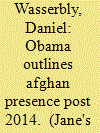

|
|
|
|
|
| Publication |
2014.
|
| Summary/Abstract |
US President Barak Obama has announced that the United States aims to keep, 9800 troops deployed in Afghanistan after the current force agreement expires at the beginning of 2015, but he would then extract most US forces before 2017.
|
|
|
|
|
|
|
|
|
|
|
|
|
|
|
|
|
|
|
|
|